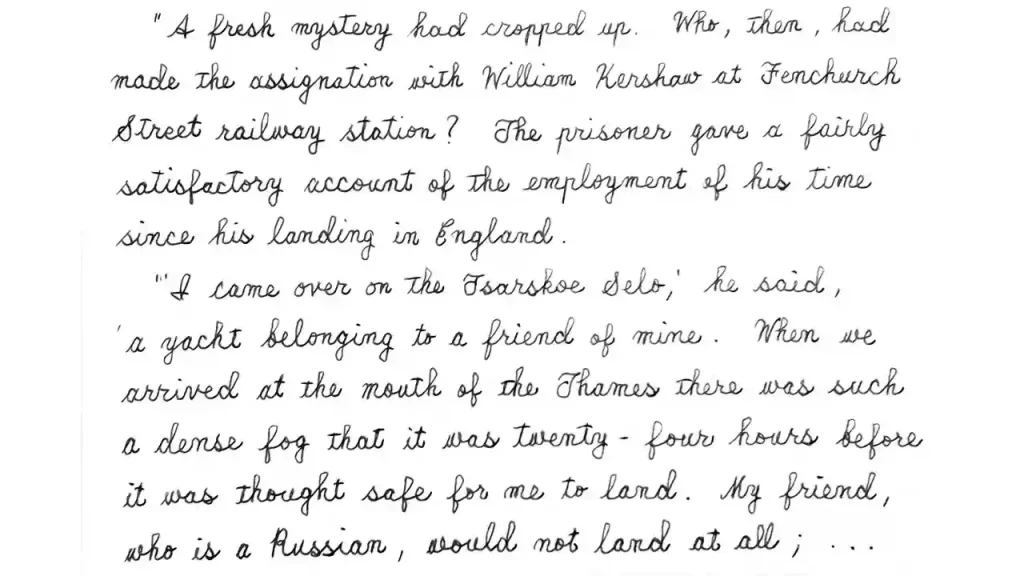“A fresh mystery had cropped up.
The Old Man in the Corner
- subject: なぞ
- predicate: みつかる
「新たな謎が見つかりました」
Who, then, had made the assignation with William Kershaw at Fenchurch Street railway station?
- predicate: みっかいする
「誰が、その時、フェンチャーチ・ストリート駅でウィリアム・カーショーと密会していたのでしょう?」
The prisoner gave a fairly satisfactory account of the employment of his time since his landing in England.
- subject: ひこくにん
- predicate: せつめいする
「被告人は納得のいく説明をしました。彼がイングランドに上陸してからの活動についての」
- 納得(なっとく, convincing)
“‘I came over on the Tsarskoe Selo,’ he said, ‘a yacht belonging to a friend of mine.
『私は友人のヨットでやって来ました』
When we arrived at the mouth of the Thames there was such a dense fog that it was twenty-four hours before it was thought safe for me to land.
『私たちがテムズ川の河口に到着した時、とても濃い霧が出ていたので、上陸するのに安全だと判断するまで24時間かかりました』
My friend, who is a Russian, would not land at all; he was regularly frightened at this land of fogs.
『私の友人のロシア人はまったく上陸したがりませんでした。
彼はこの霧の陸地におびえていました』
He was going on to Madeira immediately.
『彼は直ぐにマデイラに行くつもりでした』
“‘I actually landed on Tuesday, the 10th, and took a train at once for town.
- subject: わたし
- predicate: とうかに・じょうりくする
『私が実際に上陸したのは、10日の火曜日で、すぐに列車で街へ向かいました』
- 上陸(じょうりく, landing)
I did see to my luggage and a cab, as the porter and driver told your Honour; then I tried to find my way to a refreshment-room, where I could get a glass of wine.
- subject: わたし
- predicate: わいんをのむ
- modifier: きゅうけいしつで
『ポーターとドライバーが裁判長に証言した通り、私は自分の荷物を預けました。それから、私は休憩室を探しました。そしてそこで、私はワインを一杯飲みました』
- 休憩室(きゅうけいしつ, lounge)
- 飲みました(のみました, drank)
I drifted into the waiting-room, and there I was accosted by a shabbily dressed individual, who began telling me a piteous tale.
- subject: わたし
- predicate: こえをかけられる
- modifier: まちあいしつで
『私は待合室に立ち寄りました。そしてそこで、私はみすぼらしい服装の人に声をかけられました。その人は私に哀れな話を話し始めました』
- 待合室(まちあいしつ, waiting room)
- 立ち寄りました(たちよりました, stopped by)
Who he was I do not know.
『彼が誰だったのか、私は知りません』
He said he was an old soldier who had served his country faithfully, and then been left to starve.
- subject: かれ
- predicate: ろうへい・ひもじい
『彼が言うには、自分は故郷のために働いた老兵で、ひもじい思いをしているそうです』
- 老兵(ろうへい, old soldier)
- ひもじい(hungry)
- 思い(おもい, feeling)
He begged of me to accompany him to his lodgings, where I could see his wife and starving children, and verify the truth and piteousness of his tale.
『彼は私に、自分の宿へ同行してほしいと懇願しました。
そうすれば、そこで私は彼の妻と、お腹を空かせた子供たちに出会い、彼の話の悲痛さと真実を確かめることができるだろうと』
Reference : The Old Man in the Corner by Baroness Orczy (project gutenberg)
English Story With Easy Japanese Translation
